#the fed
Text






I made some Valentine’s Day cards for you all to share with your favorite bank examiners and/or economists! With a little help from my friend @tricksypixie of course ☺️
#valentines memes#valentines day#valentines cards#jay speaks#federal reserve#the fed#interest rates#economics
54 notes
·
View notes
Text

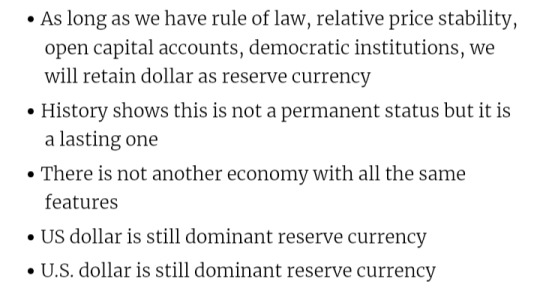
*closes my eyes and taps my shoes together*
The US Dollar is still the dominant reserve currency
The US Dollar is still the dominant reserve currency
The US Dollar is still the dominant reserve currency
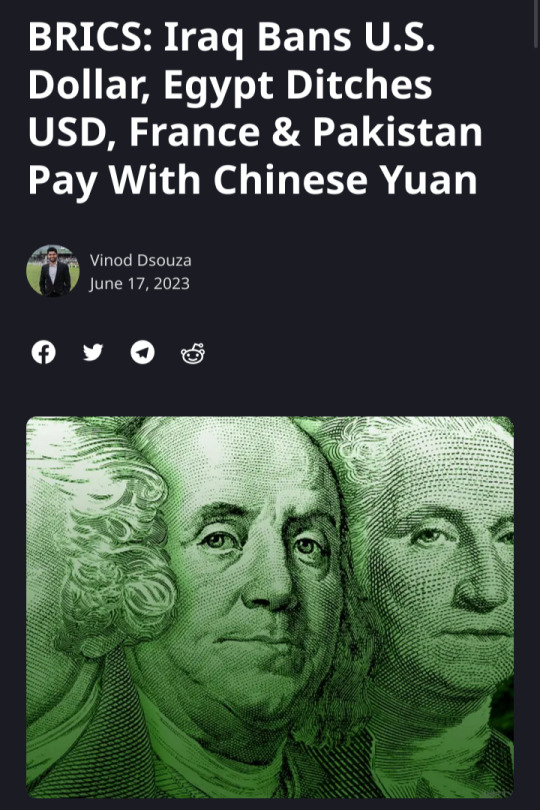
#fed#the fed#federal reserve#monetary policy#economic news#us news#us dollar#multipolar movement#multipolar world#multipolarity#economics news#socialism#communism#marxism leninism#socialist politics#socialist worker#socialist news#socialist#communist#marxism#marxist leninist#progressive politics#politics#jerome powell#us dollar dominance#neoliberalism#neoliberal capitalism#dollar imperialism#us imperialism#imperialism
31 notes
·
View notes
Text
I thought I'd heard just about every bizarre far right conspiracy theory.
The goofiest was probably the one about Obama storing 30,000 guillotines in Montana and Georgia to be used in FEMA concentration camps after Sharia Law is introduced in the US.
The recent unfortunate incident regarding Titanic tourism brought to the surface a wacko contention about the Federal Reserve System.
Far-right conspiracy theorist Stew Peters is pushing a conspiracy theory that the OceanGate submarine was purposely sunk “to keep people from visiting the Titanic wreckage” because doing so would supposedly reveal that the Titanic “was sunk by a newly created” Rothschilds-connected Federal Reserve and not an iceberg. Numerous Republican politicians and Robert F. Kennedy Jr. have appeared on Peters’ program.
Peters is a white nationalist who frequently encourages violence against his perceived enemies. He has pushed a multitude of conspiracy theories, including those related to QAnon, COVID-19, Pizzagate, flat Earth, the moon landing, and the Uvalde and Sandy Hook mass shootings.
Despite his toxic history, numerous politicians have appeared on his program, including Reps. Paul Gosar, Bob Good, Pete Sessions, and Andy Biggs; and Kennedy.
Peters is now pushing the bizarre conspiracy theory that the Titanic was actually sunk by the Rothschilds-connected Federal Reserve — not an iceberg — and the OceanGate submarine was sunk to discourage people from ever visiting the Titanic to find out the truth.
Yep, the Fed will stop at nothing to hide its diabolical secrets! 😂😱
There is a major chronological problem with this particular conspiracy theory. The RMS Titanic sunk on 15 April 1912 while the Federal Reserve System wasn't founded until 23 December 1913. But conspiracy theorists never let the facts get in the way of their derangement.
Conspiracy theories have been around for ages. But the internet makes them easier to circulate and to draw unlikely connections between totally unrelated events.
And the conspiracy nuts are seldom content believing in just one. Stew Peters is all over the genre with QAnon, vaccines, the Apollo moon landings, and topically the Fed/Titanic. He's a waterfall of far right fabulism. And his racism and antisemitism don't prevent extremist Republicans and RFK Jr. from kissing up to him.
People like that are often close to the psychological spot where deep gullibility and paranoia intersect. Though some know it's all a load of bullshit but continue to spew it for personal or political gain.
People like Stew Peters give us a good reason why nobody should get a high school diploma without first passing a course in baloney detection.
Use Carl Sagan's "Baloney Detection Kit" to Combat Fake News
#conspiracy theories#stew peters#fabulists#rms titanic#oceangate#the fed#federal reserve system#the rothschilds#the far right#baloney detection
3 notes
·
View notes
Photo

What the Fed and Madonna have in common
#Madonna#2022#CNN#The Fed#Queen Of Evolution#Queen Of Reinvention#Queen Of Pop#Madonna's Impact#The Power of Madonna#Madonna 2022
24 notes
·
View notes
Text
7/27/23
The Fed raised the interest rate by 0.25% to 5.25-5.50% overall, the highest it's been in decades and Chairman Powell said they're still open to another raise in September. Despite fears of a recession due to the rates, the US GDP grew at 2.4% during Q2. Unemployment fell to 221K last week. The ECB also raised its rates a quarter percentage to 4.25%, although it's now signalling it's ready to pause.
We're currently on track for 2023 topping 2016 as the hottest year on record. What is worrying is there is a current system in the Atlantic Ocean that helps regulate weather, and it may collapse some time this century.
The army decided to side with the Nigerien presidential guard, so we now have a coup in Niger.
The Ukraine is starting another counteroffensive in the south. They have not made much progress against Russian defenses.
Hunter Biden's situation became much more murky yesterday. Biden was charged with failure to pay taxes and illegal possession of a weapon. Prosecutors made a plea agreement for two years probation if he pled guilty, but when this was presented to the judge, she did not like some of the terms, particularly for the gun charge, so Biden withdrew the guilty plea and stated not guilty. Republicans have been howling that Biden was given lesser punishment for being the president's son. I've talked to some people about it and they said with a plea agreement it's not unusual, but it's possible prosecutors immediately leaned toward preferential treatment.
Mitch McConnell randomly stopped talking for twenty seconds during a press conference yesterday. Considering he's 81 and has fallen a few times this year, one resulting in a concussion, it's pretty worrying.
1) Reuters, WSJ, The Hill 2) France24 3) Al Jazeera 4) Washington Post 5) AP 6) NYT
6 notes
·
View notes
Text
bro_
america is
inCREDulously
ill-managed.
dey
gotta do better_
ZERO GOV. “ OFFICIALS “ SHOULD
HAVE PERSONAL
“ STOCK MARKET “
ACCESS.
👁
past
yur programming
THE WORLD IS LIVE. 🎥
youtube
#the fed#is a joke#the stock market#is a scam#financial markets and investing#wake up#the world is live#Youtube
6 notes
·
View notes
Text
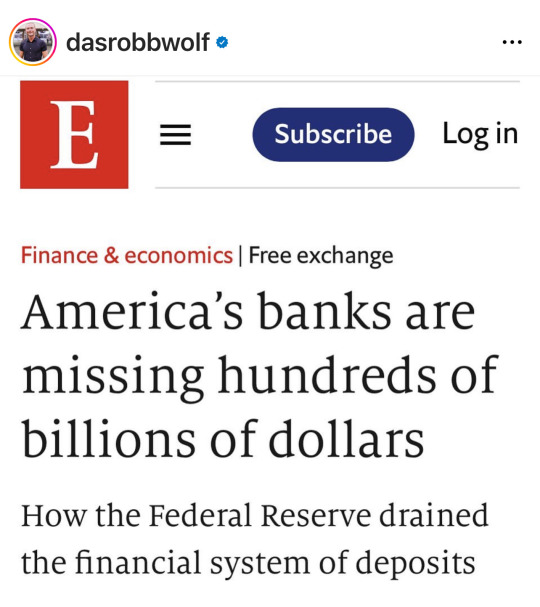
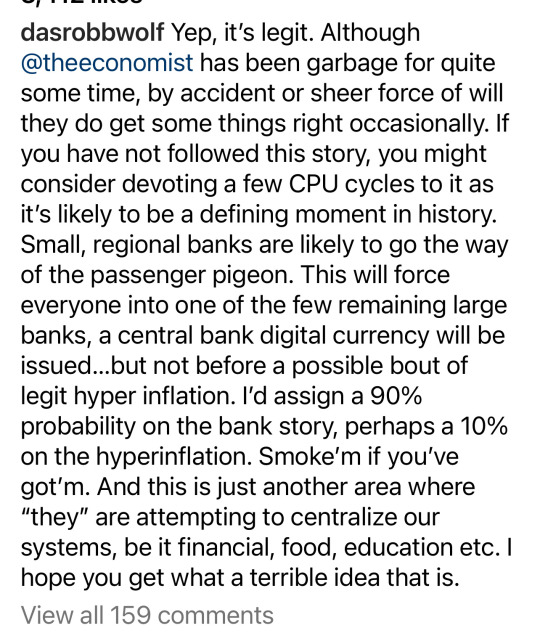
.
2 notes
·
View notes
Text
Why the Fed wants to crush workers
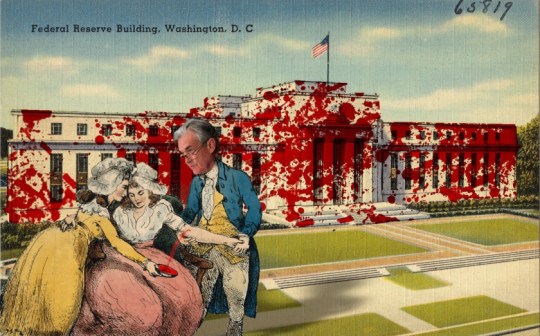
The US Federal Reserve has two imperatives: keeping employment high and inflation low. But when these come into conflict — when unemployment falls to near-zero — the Fed forgets all about full employment and cranks up interest rates to “cool the economy” (that is, “to destroy jobs and increase unemployment”).
An economy “cools down” when workers have less money, which means that the prices offered for goods and services go down, as fewer workers have less money to spend. As with every macroeconomic policy, raising interest rates has “distributional effects,” which is economist-speak for “winners and losers.”
Predicting who wins and who loses when interest rates go up requires that we understand the economic relations between different kinds of rich people, as well as relations between rich people and working people. Writing today for The American Prospect’s superb Great Inflation Myths series, Gerald Epstein and Aaron Medlin break it down:
https://prospect.org/economy/2023-01-19-inflation-federal-reserve-protects-one-percent/
Recall that the Fed has two priorities: full employment and low interest rates. But when it weighs these priorities, it does so through “finance colored” glasses: as an institution, the Fed requires help from banks to carry out its policies, while Fed employees rely on those banks for cushy, high-paid jobs when they rotate out of public service.
Inflation is bad for banks, whose fortunes rise and fall based on the value of the interest payments they collect from debtors. When the value of the dollar declines, lenders lose and borrowers win. Think of it this way: say you borrow $10,000 to buy a car, at a moment when $10k is two months’ wages for the average US worker. Then inflation hits: prices go up, workers demand higher pay to keep pace, and a couple years later, $10k is one month’s wages.
If your wages kept pace with inflation, you’re now getting twice as many dollars as you were when you took out the loan. Don’t get too excited: these dollars buy the same quantity of goods as your pre-inflation salary. However, the share of your income that’s eaten by that monthly car-loan payment has been cut in half. You just got a real-terms 50% discount on your car loan!
Inflation is great news for borrowers, bad news for lenders, and any given financial institution is more likely to be a lender than a borrower. The finance sector is the creditor sector, and the Fed is institutionally and personally loyal to the finance sector. When creditors and debtors have opposing interests, the Fed helps creditors win.
The US is a debtor nation. Not the national debt — federal debt and deficits are just scorekeeping. The US government spends money into existence and taxes it out of existence, every single day. If the USG has a deficit, that means it spent more than than it taxed, which is another way of saying that it left more dollars in the economy this year than it took out of it. If the US runs a “balanced budget,” then every dollar that was created this year was matched by another dollar that was annihilated. If the US runs a “surplus,” then there are fewer dollars left for us to use than there were at the start of the year.
The US debt that matters isn’t the federal debt, it’s the private sector’s debt. Your debt and mine. We are a debtor nation. Half of Americans have less than $400 in the bank.
https://www.fool.com/the-ascent/personal-finance/articles/49-of-americans-couldnt-cover-a-400-emergency-expense-today-up-from-32-in-november/
Most Americans have little to no retirement savings. Decades of wage stagnation has left Americans with less buying power, and the economy has been running on consumer debt for a generation. Meanwhile, working Americans have been burdened with forms of inflation the Fed doesn’t give a shit about, like skyrocketing costs for housing and higher education.
When politicians jawbone about “inflation,” they’re talking about the inflation that matters to creditors. Debtors — the bottom 90% — have been burdened with three decades’ worth of steadily mounting inflation that no one talks about. Yesterday, the Prospect ran Nancy Folbre’s outstanding piece on “care inflation” — the skyrocketing costs of day-care, nursing homes, eldercare, etc:
https://prospect.org/economy/2023-01-18-inflation-unfair-costs-of-care/
As Folbre wrote, these costs are doubly burdensome, because they fall on family members (almost entirely women), who have to sacrifice their own earning potential to care for children, or aging people, or disabled family members. The cost of care has increased every year since 1997:
https://pluralistic.net/2023/01/18/wages-for-housework/#low-wage-workers-vs-poor-consumers
So while politicians and economists talk about rescuing “savers” from having their nest-eggs whittled away by inflation, these savers represent a minuscule and dwindling proportion of the public. The real beneficiaries of interest rate hikes isn’t savers, it’s lenders.
Full employment is bad for the wealthy. When everyone has a job, wages go up, because bosses can’t threaten workers with “exile to the reserve army of the unemployed.” If workers are afraid of ending up jobless and homeless, then executives seeking to increase their own firms’ profits can shift money from workers to shareholders without their workers quitting (and if the workers do quit, there are plenty more desperate for their jobs).
What’s more, those same executives own huge portfolios of “financialized” assets — that is, they own claims on the interest payments that borrowers in the economy pay to creditors.
The purpose of raising interest rates is to “cool the economy,” a euphemism for increasing unemployment and reducing wages. Fighting inflation helps creditors and hurts debtors. The same people who benefit from increased unemployment also benefit from low inflation.
Thus: “the current Fed policy of rapidly raising interest rates to fight inflation by throwing people out of work serves as a wealth protection device for the top one percent.”
Now, it’s also true that high interest rates tend to tank the stock market, and rich people also own a lot of stock. This is where it’s important to draw distinctions within the capital class: the merely rich do things for a living (and thus care about companies’ productive capacity), while the super-rich own things for a living, and care about debt service.
Epstein and Medlin are economists at UMass Amherst, and they built a model that looks at the distributional outcomes (that is, the winners and losers) from interest rate hikes, using data from 40 years’ worth of Fed rate hikes:
https://peri.umass.edu/images/Medlin_Epstein_PERI_inflation_conf_WP.pdf
They concluded that “The net impact of the Fed’s restrictive monetary policy on the wealth of the top one percent depends on the timing and balance of [lower inflation and higher interest]. It turns out that in recent decades the outcome has, on balance, worked out quite well for the wealthy.”
How well? “Without intervention by the Fed, a 6 percent acceleration of inflation would erode their wealth by around 30 percent in real terms after three years…when the Fed intervenes with an aggressive tightening, the 1%’s wealth only declines about 16 percent after three years. That is a 14 percent net gain in real terms.”
This is why you see a split between the one-percenters and the ten-percenters in whether the Fed should continue to jack interest rates up. For the 1%, inflation hikes produce massive, long term gains. For the 10%, those gains are smaller and take longer to materialize.
Meanwhile, when there is mass unemployment, both groups benefit from lower wages and are happy to keep interest rates at zero, a rate that (in the absence of a wealth tax) creates massive asset bubbles that drive up the value of houses, stocks and other things that rich people own lots more of than everyone else.
This explains a lot about the current enthusiasm for high interest rates, despite high interest rates’ ability to cause inflation, as Joseph Stiglitz and Ira Regmi wrote in their recent Roosevelt Institute paper:
https://rooseveltinstitute.org/wp-content/uploads/2022/12/RI_CausesofandResponsestoTodaysInflation_Report_202212.pdf
The two esteemed economists compared interest rate hikes to medieval bloodletting, where “doctors” did “more of the same when their therapy failed until the patient either had a miraculous recovery (for which the bloodletters took credit) or died (which was more likely).”
As they document, workers today aren’t recreating the dread “wage-price spiral” of the 1970s: despite low levels of unemployment, workers wages still aren’t keeping up with inflation. Inflation itself is falling, for the fairly obvious reason that covid supply-chain shocks are dwindling and substitutes for Russian gas are coming online.
Economic activity is “largely below trend,” and with healthy levels of sales in “non-traded goods” (imports), meaning that the stuff that American workers are consuming isn’t coming out of America’s pool of resources or manufactured goods, and that spending is leaving the US economy, rather than contributing to an American firm’s buying power.
Despite this, the Fed has a substantial cheering section for continued interest rates, composed of the ultra-rich and their lickspittle Renfields. While the specifics are quite modern, the underlying dynamic is as old as civilization itself.
Historian Michael Hudson specializes in the role that debt and credit played in different societies. As he’s written, ancient civilizations long ago discovered that without periodic debt cancellation, an ever larger share of a societies’ productive capacity gets diverted to the whims of a small elite of lenders, until civilization itself collapses:
https://www.nakedcapitalism.com/2022/07/michael-hudson-from-junk-economics-to-a-false-view-of-history-where-western-civilization-took-a-wrong-turn.html
Here’s how that dynamic goes: to produce things, you need inputs. Farmers need seed, fertilizer, and farm-hands to produce crops. Crucially, you need to acquire these inputs before the crops come in — which means you need to be able to buy inputs before you sell the crops. You have to borrow.
In good years, this works out fine. You borrow money, buy your inputs, produce and sell your goods, and repay the debt. But even the best-prepared producer can get a bad beat: floods, droughts, blights, pandemics…Play the game long enough and eventually you’ll find yourself unable to repay the debt.
In the next round, you go into things owing more money than you can cover, even if you have a bumper crop. You sell your crop, pay as much of the debt as you can, and go into the next season having to borrow more on top of the overhang from the last crisis. This continues over time, until you get another crisis, which you have no reserves to cover because they’ve all been eaten up paying off the last crisis. You go further into debt.
Over the long run, this dynamic produces a society of creditors whose wealth increases every year, who can make coercive claims on the productive labor of everyone else, who not only owes them money, but will owe even more as a result of doing the work that is demanded of them.
Successful ancient civilizations fought this with Jubilee: periodic festivals of debt-forgiveness, which were announced when new monarchs assumed their thrones, or after successful wars, or just whenever the creditor class was getting too powerful and threatened the crown.
Of course, creditors hated this and fought it bitterly, just as our modern one-percenters do. When rulers managed to hold them at bay, their nations prospered. But when creditors captured the state and abolished Jubilee, as happened in ancient Rome, the state collapsed:
https://pluralistic.net/2022/07/08/jubilant/#construire-des-passerelles
Are we speedrunning the collapse of Rome? It’s not for me to say, but I strongly recommend reading Margaret Coker’s in-depth Propublica investigation on how title lenders (loansharks that hit desperate, low-income borrowers with triple-digit interest loans) fired any employee who explained to a borrower that they needed to make more than the minimum payment, or they’d never pay off their debts:
https://www.propublica.org/article/inside-sales-practices-of-biggest-title-lender-in-us
[Image ID: A vintage postcard illustration of the Federal Reserve building in Washington, DC. The building is spattered with blood. In the foreground is a medieval woodcut of a physician bleeding a woman into a bowl while another woman holds a bowl to catch the blood. The physician's head has been replaced with that of Federal Reserve Chairman Jerome Powell.]
#pluralistic#worker power#austerity#monetarism#jerome powell#the fed#federal reserve#finance#banking#economics#macroeconomics#interest rates#the american prospect#the great inflation myths#debt#graeber#michael hudson#indenture#medieval bloodletters
464 notes
·
View notes
Text
I will take poll results into account next week. I’m sure the FOMC will be very grateful to hear your responses, valued citizens of the Tumblr ^.^
#federal open market committee#federal reserve#the fed#interest rates#jerome powell#polls#finance#finance polls#jay speaks
150 notes
·
View notes
Text
Max Caster about to write his rap for tomorrow on parchment and quill
6 notes
·
View notes
Link
#thewaronyou
2 notes
·
View notes
Text

god bless
41K notes
·
View notes
Text










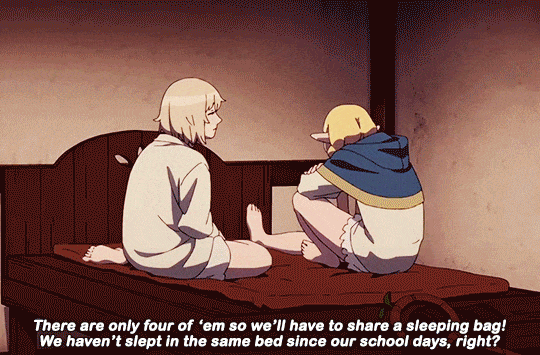


"i would know her by reformed body alone... i would know her in death"
also... there's official art


#happy national lesbian necromancy day#studio trigger somehow made it even gayer#between this and senshi pantyshot... we were fed#dungeon meshi#delicious in dungeon#spoilers#yes i needed to make my gifs huge#for... you know...#science#farcille#falin touden#marcille donato#long post#anime#art#autoplay warning
25K notes
·
View notes
Text
anyways (I say this as someone who is deeply critical of the united states government, military, unchecked capitalism, police, etc) I am SICK of people treating america as if it has no cultural value or positives so..... I love u 85 million acres (bigger than italy) of national parks. I love u harlem renaissance. I love u groundhogs day. I love u sweet tea and fried chicken and jambalaya. I love u apple cider donuts and maizes on crisp autumn days. I love u 95k miles of coastlines and new england fisherman and hand knitted sweaters. I love u halloween where millions of people dress up and give candy to strangers and carve jack o’lanterns. I love u small talk and small towns and potlucks and bringing over casseroles to your struggling neighbors. I love u cowboys and ranch hands and arizonian cactus. I love u appalachian trail and dirtbikes and divebars. I love u sparklers and fireflies. I love u mark twain and toni morrison and emily dickinson and henry david thoreau. I love u rock n roll i love u bluegrass and hippies i love u jimi hendrix and nirvana and CCR and janis joplin. I love u victorian houses and jonny appleseed and john henry and mothman and bigfoot. I love u foggy days in the pacific northwest and neon signs and roadside attractions. I love u baseball and 1950s diners and soft serve. I love u native american art and pop art and poptarts. I love u blue jeans and barbecues and jazz musicians
82K notes
·
View notes
Text
2/1/23
The Fed raised interest rates by 0.25%. It's a lower jump than previous hikes in the past few months, signalling the Fed believes inflation is slowing down but is still present. It also hinted there will be another increase next month.
I forgot to mention this, but the Biden administration announced in May it would be ending the national public health emergencies that have been in place since 2020. Doing so would end the money flow from the federal government, e.g. free tests, less funds for hospitals dealing with COVID patients, etc. However doing so also ends the Trump administration's order to shut the southern border, which the Biden administration has already been fighting in the courts to remove.
Four suspects in former Haitian President Moise's assassination two years ago are being sent to the US for trial. Although many perpetrators remain at large, these four seem to be rather central to the plans. The issue is after Moise's death gang violence erupted extensively all over the country, and there is actually a large protest right now by police officers in Port-au-Prince because so many of them are dying to the gangs. Consequently any judge who is trying to preside over the assassination investigation is receiving very credible death threats. Because the plot seems to have been conceived in Florida, the suspects could fall under US jurisdiction (three of them are Haitian-American), so that's why they're being sent there after everything stalled in Haiti.
The FBI searched Biden's vacation home for classified documents but didn't find any.
1) WSJ 2) CNN, Politico 3) NYT, AP 4) NYT
2 notes
·
View notes
